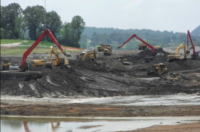A Canada Supreme Court ruling that makes Ontario municipal project owners—and possibly others—akin to contractors as jobsite “employers” under provincial law by extending liability to them for accidental site injury or death is raising industry concern, according to public officials, attorneys and contractors.
The court concluded that "a person can be an employer ... even where they lack control over the worker or the workplace."
In a rare 4-4 decision issued by default in November after one justice resigned, Canada’s high court let stand a lower appeals court ruling that the city of Sudbury, Ontario, and contractor Interpaving Ltd. were both legally responsible under the province Health and Safety Act, for the death of a 58-year old pedestrian struck by a road grader backing up during water main repairs in 2015. The Supreme Court decision also dismissed the city’s appeal.
In the prevailing decision, judges found that the city was the "employer of the inspectors" who checked on the project and was also "employer" of the firm with which it contracted for the water main-related repaving work. The court said the provincial Ministry of Labour, which had charged the contractor and city, does not have to prove that the latter had direct control over site workers to have the safety liability.
Interpaving pleaded guilty, was fined more than $143,000 and faced a five-year public bidding ban. A lower provincial court acquitted Sudbury at trial, partly based on officials' claim that city quality-control inspectors had previously visited the accident site and raised safety concerns. But the high court vacated an appeals court ruling upholding the acquittal.
'Overlapping Duties'
The high court definition of municipalities and other property owners as employers of contracted workers was based in part on a 1976 Ontario safety commission ruling that allocated responsibility to more than one entity to ensure safety compliance. “This purpose is achieved through the imposition of shared and overlapping duties,” Justice Sheilah Martin wrote in the prevailing decision. "The case law is clear that one employer cannot point a finger at another employer who might be closer to the situation. Every employer has a duty to see that the workplace is safe."
In a dissenting opinion, some judges noted that “If everybody is responsible for everything, it is difficult for a given employer to determine which of the hundreds of regulatory measures they are responsible for overseeing.”
The decision, however, still allows a “due diligence” defense for Sudbury to now prove to a lower provincial court that it had no control over site decisions but did have authority over those it hired to supervise the activity and took all reasonable steps through contract provisions or by municipal bylaw to avoid the potential “employer” liability.
A date has not yet been set for that lower court hearing.
Ripple Effects
Attorneys from Toronto-based law firm Osler, Hoskin & Harcourt LLP speculated whether Ontario will amend the safety law to adjust the liability impact for owners. Currently, it mandates fines of more than $1 million for a corporation guilty plea or conviction, and up to a year in jail for an individual.
An Ontario labor ministry spokesperson told CBC News that the agency would not comment on the ruling but that it "regularly reviews the [health and safety law] to determine if any updates are required."
in an interview, Giovanni Cautillo, president of the Ontario General Contractors Association, said the traditional relationships between contractors and owners “are being rocked” by the court’s decision. “Future contracts are likely to include new clauses on indemnities and liability influenced by this decision, and general contractors might face pressure from owners to plead guilty in accidents, regardless of actual negligence,” he said.
Toronto “is concerned that generally accepted norms respecting the allocation of responsibility under the [Ontario law] for health and safety on construction projects have been disrupted" by the decision. the city said in a statement to ENR. It added that contractors have day-to-day managerial control, specialized knowledge and expertise to address health and safety issues on project sites.
A spokesperson said the city will continue to require contractors to have obtained existing or equivalent safety certifications, “to ensure the necessary work is undertaken by qualified companies.”
As a tie vote, the decision may not result in a binding legal precedent but it is still entitled to “great respect," Jeremy Opolsky, a Toronto lawyer, told the Globe and Mail.
Edmonton and Vancouver officials said they were studying the court’s decision and declined to comment further.



